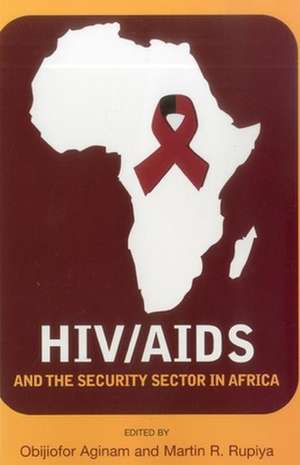HIV/AIDS and the Security Sector in Africa
Editat de Obijiofor Aginam, Martin R. Rupiyaen Limba Engleză Paperback – 17 mai 2012
Throughout history, communicable diseases have devastated armies and weakened the capacity of state institutions to perform core security functions. Today, the HIV/AIDS epidemic in Africa has prompted many of the affected countries to initiate policies aimed at addressing its impact on their armed forces, police, and prisons. This volume explores the dynamics of how the security sectors of selected African states have responded to the complex and multifaceted challenges of HIV/AIDS.
Current and impending African HIV/AIDS policies address a range of security-related issues:
• The role of peacekeepers in the spread or control of HIV
• The dilemma of public health (the need to control HIV) versus human rights (protection against mandatory medical testing) needs
• The gender dimensions of HIV in the armed forces
• The impact of HIV on the police and prisons
The chapters in HIV/AIDS and the Security Sector in Africa are written by African practitioners, including commissioned officers who are currently serving in the armed forces, medical officers and nurses working in the military, and African policy and academic experts. While the book does not comprehensively address all aspects of the impact of HIV/AIDS on the security sector, the contributors nonetheless highlight the potentials and limits of existing policies.
Current and impending African HIV/AIDS policies address a range of security-related issues:
• The role of peacekeepers in the spread or control of HIV
• The dilemma of public health (the need to control HIV) versus human rights (protection against mandatory medical testing) needs
• The gender dimensions of HIV in the armed forces
• The impact of HIV on the police and prisons
The chapters in HIV/AIDS and the Security Sector in Africa are written by African practitioners, including commissioned officers who are currently serving in the armed forces, medical officers and nurses working in the military, and African policy and academic experts. While the book does not comprehensively address all aspects of the impact of HIV/AIDS on the security sector, the contributors nonetheless highlight the potentials and limits of existing policies.
Preț: 255.71 lei
Preț vechi: 269.17 lei
-5% Nou
Puncte Express: 384
Preț estimativ în valută:
48.93€ • 51.22$ • 40.73£
48.93€ • 51.22$ • 40.73£
Carte tipărită la comandă
Livrare economică 31 martie-14 aprilie
Preluare comenzi: 021 569.72.76
Specificații
ISBN-13: 9789280812091
ISBN-10: 9280812092
Pagini: 280
Dimensiuni: 152 x 229 x 15 mm
Greutate: 0.43 kg
Editura: Brookings Institution Press
Colecția United Nations University Press
ISBN-10: 9280812092
Pagini: 280
Dimensiuni: 152 x 229 x 15 mm
Greutate: 0.43 kg
Editura: Brookings Institution Press
Colecția United Nations University Press
Notă biografică
Obijiofor Aginam is academic officer and head of section for international cooperation and development in the United Nations University's Institute for Sustainability and Peace, Tokyo. He is also adjunct research professor of law at Carleton University, Ottawa. Martin R. Rupiya is currently executive director of the African Public Policy and Research Institute (APPRI), Pretoria, South Africa. He was formerly manager of the Military and HIV/ AIDS (MilAIDS) project and senior researcher in the Defence Sector Programme at the Institute for Security Studies (ISS), Pretoria.
Descriere
Throughout history, communicable diseases have devastated armies and weakened the capacity of state institutions to perform core security functions. Today, the HIV/AIDS epidemic in Africa has prompted many of the affected countries to initiate policies aimed at addressing its impact on their armed forces, police, and prisons. This volume explores the dynamics of how the security sectors of selected African states have responded to the complex and multifaceted challenges of HIV/AIDS.
Current and impending African HIV/AIDS policies address a range of security-related issues:
• The role of peacekeepers in the spread or control of HIV
• The dilemma of public health (the need to control HIV) versus human rights (protection against mandatory medical testing) needs
• The gender dimensions of HIV in the armed forces
• The impact of HIV on the police and prisons
The chapters in HIV/AIDS and the Security Sector in Africa are written by African practitioners, including commissioned officers who are currently serving in the armed forces, medical officers and nurses working in the military, and African policy and academic experts. While the book does not comprehensively address all aspects of the impact of HIV/AIDS on the security sector, the contributors nonetheless highlight the potentials and limits of existing policies.
Current and impending African HIV/AIDS policies address a range of security-related issues:
• The role of peacekeepers in the spread or control of HIV
• The dilemma of public health (the need to control HIV) versus human rights (protection against mandatory medical testing) needs
• The gender dimensions of HIV in the armed forces
• The impact of HIV on the police and prisons
The chapters in HIV/AIDS and the Security Sector in Africa are written by African practitioners, including commissioned officers who are currently serving in the armed forces, medical officers and nurses working in the military, and African policy and academic experts. While the book does not comprehensively address all aspects of the impact of HIV/AIDS on the security sector, the contributors nonetheless highlight the potentials and limits of existing policies.
